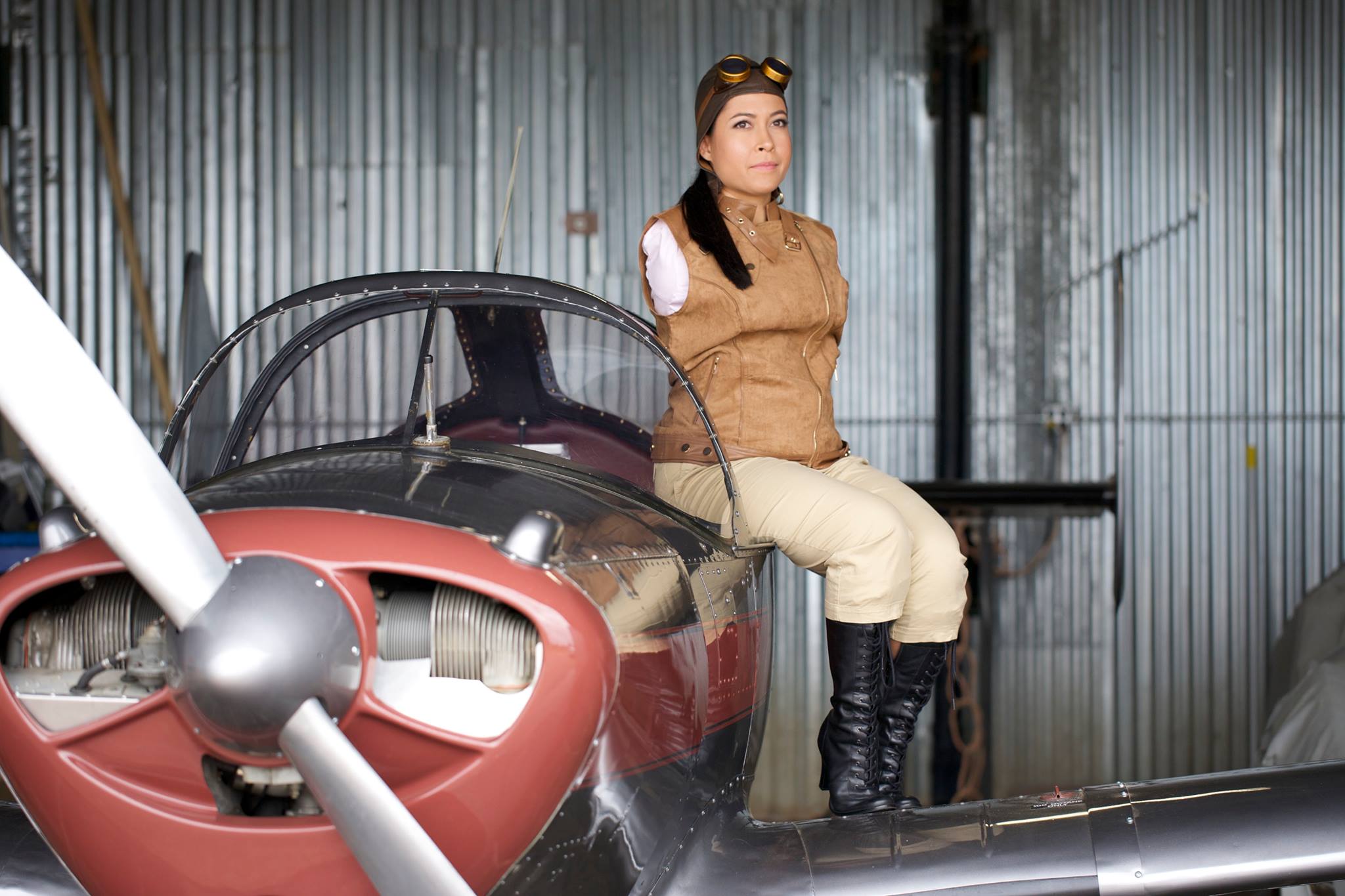Woman Born Without Arms Becomes the First Licensed Pilot to Fly a Plane With Just Her Feet

Imagine reaching for the sky—not with your hands—but with your feet. Jessica Cox did just that. She didn’t just dream of flying; she made it her reality, becoming the world’s first licensed pilot without arms. In a world where many define themselves by limitations, Jessica’s story is a profound reminder that the only real barriers are the ones we place in our own minds. What if we could all think beyond the expected, break through the boundaries, and truly soar? This is a story of resilience, innovation, and breaking societal expectations.
Living Life on Her Own Terms
Jessica Cox didn’t let being born without arms define her—she flipped the script. From day one, her parents made a decision that would shape her life: no special accommodations. No extra help. Just the same love, care, and expectations as any other child. They wanted her to experience life as “normal,” and that meant raising her without feeling sorry for her. Her mom even signed her up for tap dancing and Girl Scouts, two activities that forced her to interact with her peers and embrace the world around her. It wasn’t always easy, but that approach gave Jessica a mindset that would later push her to accomplish the extraordinary.
For Jessica, “normal” didn’t mean doing things the way most people did. She quickly learned to rely on her feet for tasks that others used their hands for—writing, eating, and even playing piano. Sure, she tried prosthetic arms for a while, but they didn’t fit with her style. They were uncomfortable and restrictive, and frankly, she wasn’t about to let anything hold her back. So she made the choice to ditch them altogether. By deciding to use her feet, Jessica didn’t just adapt to life—she excelled at it. From that point on, she shaped her own world, developing a level of dexterity and independence that most people never think twice about. It was clear—she wasn’t just learning to live with her condition, she was learning how to thrive in spite of it.
Turning Anger Into Strength: How Taekwondo Shaped Jessica’s Resilience
Jessica didn’t just face physical challenges—she had to confront a mental battle as well. Growing up without arms wasn’t easy, especially with the bullying and stares that came with it. There were days when the anger inside her felt like it might overflow. But instead of letting it control her, Jessica found an outlet that would change her life: taekwondo. At the age of 10, she started practicing martial arts—a decision that would shape the person she became. It wasn’t just about learning to fight; it was about learning to control her mind, her body, and her emotions.
By the time she was 14, Jessica had earned her first black belt. It wasn’t just a testament to her physical skills—it was proof that she could adapt, persevere, and achieve, no matter the obstacles. The discipline she learned in taekwondo became the foundation for every challenge she faced moving forward. It taught her how to focus, how to rise after every fall, and how to take control of her own narrative. Jessica wasn’t just surviving; she was thriving. And in the process, she learned something important—real strength doesn’t come from what you can do with your body, but from what you believe you can do with your mind.
From Anxiety to Passion for Aviation
For most people, fear is just a part of life. But for Jessica, fear was something that nearly held her back from one of her biggest dreams: flying. The thought of being thousands of feet in the air, disconnected from the ground, was enough to make anyone anxious. For Jessica, it was a battle between her desire to fly and the anxiety of losing control. But she didn’t let that fear define her. One day, a fighter pilot offered her a chance to sit in the cockpit of a small aircraft. He handed her the controls, and in that moment, something shifted. What was once paralyzing fear transformed into fascination. The thrill of flying overtook the anxiety, and Jessica knew she had to face this challenge head-on.
Jessica took the leap and started flight training in 2005. The road was tough. Every lesson required her to adapt—using her feet instead of her hands to control the aircraft. But with each flight, her confidence grew, and so did her love for aviation. She was no longer just facing her fear—she was mastering it. And with every mile flown, Jessica proved that sometimes the greatest rewards come when we push through our fears and take the reins of our own destiny.
Breaking Ground: Becoming a Licensed Pilot
Becoming a pilot wasn’t just about learning how to fly for Jessica—it was about doing something no one had ever done before. Flying with her feet instead of her hands? That was uncharted territory. Jessica trained in a special aircraft, the ERCO 415-C Ercoupe, which didn’t have rudder pedals, making it possible for her to control the plane with her feet. But even with the right equipment, she was essentially building her own way to fly. Every lesson was a challenge, filled with trial and error, adjusting controls, and figuring out how to make it all work. But Jessica wasn’t the type to back down from a challenge.
After three years of nonstop training and pushing the limits, Jessica did it. In October 2008, she earned her pilot’s license, becoming the first armless person to ever do so. Think about that for a second—she didn’t just overcome her own fears or break personal barriers. She told the world, loud and clear: “Don’t tell me what I can or can’t do. I’m going to do it my way.” It wasn’t just about flying a plane—it was about showing everyone that with enough determination and creativity, anything is possible.
Breaking Stereotypes and Inspiring Change
Jessica’s journey goes far beyond becoming a pilot. It’s about completely flipping the script on what people think is possible. How many times have we all heard, “That’s not possible for someone like you”? If I had a dollar for every time someone was told they couldn’t do something because of their background, circumstances, or appearance, we’d all be a lot richer. But Jessica? She didn’t let that stop her. Instead of accepting the world’s idea of what she could or couldn’t do, she set out to show them otherwise.
Her achievements speak volumes, but it’s her mindset that truly sets her apart. “Disability does not mean inability.” Simple, right? But those words carry so much power. Jessica’s lived them every day, and now she’s spreading them like wildfire. She’s not just inspiring people; she’s challenging them to rewrite their own rules. Imagine hearing her speak—she doesn’t just tell you her story; she makes you believe that you, too, can challenge whatever limits have been placed on you. And that’s the beauty of it. Jessica’s not here to show us what she can do—she’s here to show us all that we are capable of so much more than we think.
Soaring Beyond Limits
You know what’s powerful about Jessica Cox’s story? It’s not just about her becoming a pilot—it’s about her showing all of us that the limits we think we have are often just in our heads. How many times have we stopped ourselves because we thought something was “impossible”? We get stuck in the “what ifs” and “I can’t” thoughts. But Jessica didn’t do that. She looked at the world telling her what she couldn’t do and thought, “Watch me.” And then, she did it.
Her story doesn’t just inspire; it challenges. It challenges us to stop playing small and start questioning what’s possible. Think about it: If she can become the world’s first licensed armless pilot, what’s really stopping you from chasing your own dreams? The next time life throws a challenge your way, don’t let it define you. Let it fuel you, just like Jessica did. Because if she can break barriers in ways most of us can’t even imagine, what’s your excuse?
Featured image from Jessica Cox on Facebook
Loading...






